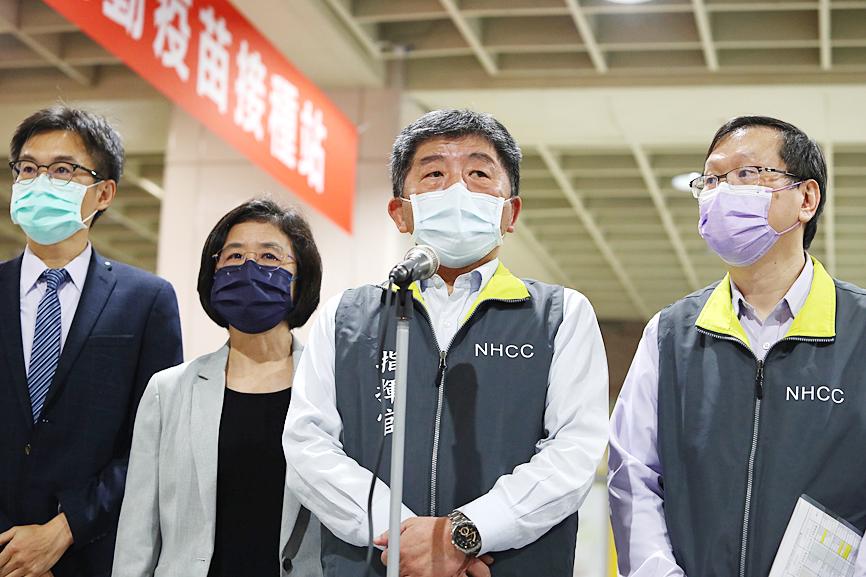A woman has tested positive for COVID-19 after being infected in Taiwan, the first domestic case since Nov. 4, Minister of Health and Welfare Chen Shih-chung (陳時中), who heads the Central Epidemic Command Center (CECC), said yesterday.
The woman had a cycle threshold value of 15, indicating a recent infection, the CECC said.
The CECC confirmed Chinese-language media reports that the woman works at a lab at Academia Sinica, where she is thought to have contracted the disease.

Photo: CNA
The institution in Taipei’s Nangang District (南港) said in a separate statement last night that all public areas on its campus would be closed today, and meetings and events would be either postponed or conducted online.
Meanwhile, people arriving in Taiwan from Tuesday next week are required to submit a negative COVID-19 polymerase chain reaction (PCR) test conducted within three calendar days of their departure rather than three business days, the CECC announced.
The CECC is instituting a three-step set of pandemic prevention guidelines for travelers arriving between Tuesday next week and Feb. 14, with an influx expected ahead of the Lunar New Year holiday, which starts late next month.
First, people must prepare all of the documentation — which can be stored electronically — that are required before they depart, it said.
Requirements differ depending on quarantine protocols, it said.
For example, people who are to quarantine for 14 days in a designated facility only need to provide a negative PCR test and proof of accommodation, the CECC said.
Those undergoing 10 days in a facility followed by four days at home need to provide these two items, as well as the name, ID and telephone number of any cohabitants, it said.
People who are to spend half their quarantine in a facility and half at home must prepare all of the above information and proof of vaccination, although those aged 12 or under are exempted, it said.
Second, an online Quarantine System for Entry form must be filled out within 48 hours before departure, the CECC said, adding that the form — available at hdhq.mohw.gov.tw — must be presented at the airport before boarding.
Third is the post-arrival procedure, which starts with confirming receipt of electronic messages and presentation of disease prevention documents, it said.
After passing through immigration and luggage collection, new arrivals must submit to rapid testing for COVID-19 before boarding a designated vehicle to their accommodation, the center said.
Separately, Taiwan took delivery of a shipment of 1.92 million doses of the Pfizer-BioNTech COVID-19 vaccine.
The expiration date on the batch is March 25, the CECC said.
The delivery is part of 15 million doses ordered by the Hon Hai Precision Co-affiliated Yonglin Foundation, Taiwan Semiconductor Manufacturing Co and the Buddhist Compassion Relief Tzu Chi Foundation, and donated to the government’s distribution program.
More than 12.39 million doses of the 15 million have been delivered, CECC data showed.
Additional reporting by CNA

A magnitude 7.0 earthquake struck off Yilan at 11:05pm yesterday, the Central Weather Administration (CWA) said. The epicenter was located at sea, about 32.3km east of Yilan County Hall, at a depth of 72.8km, CWA data showed There were no immediate reports of damage. The intensity of the quake, which gauges the actual effect of a seismic event, measured 4 in Yilan County area on Taiwan’s seven-tier intensity scale, the data showed. It measured 4 in other parts of eastern, northern and central Taiwan as well as Tainan, and 3 in Kaohsiung and Pingtung County, and 2 in Lienchiang and Penghu counties and 1

FOREIGN INTERFERENCE: Beijing would likely intensify public opinion warfare in next year’s local elections to prevent Lai from getting re-elected, the ‘Yomiuri Shimbun’ said Internal documents from a Chinese artificial intelligence (AI) company indicated that China has been using the technology to intervene in foreign elections, including propaganda targeting Taiwan’s local elections next year and presidential elections in 2028, a Japanese newspaper reported yesterday. The Institute of National Security of Vanderbilt University obtained nearly 400 pages of documents from GoLaxy, a company with ties to the Chinese government, and found evidence that it had apparently deployed sophisticated, AI-driven propaganda campaigns in Hong Kong and Taiwan to shape public opinion, the Yomiuri Shimbun reported. GoLaxy provides insights, situation analysis and public opinion-shaping technology by conducting network surveillance

‘POLITICAL GAME’: DPP lawmakers said the motion would not meet the legislative threshold needed, and accused the KMT and the TPP of trivializing the Constitution The Legislative Yuan yesterday approved a motion to initiate impeachment proceedings against President William Lai (賴清德), saying he had undermined Taiwan’s constitutional order and democracy. The motion was approved 61-50 by lawmakers from the main opposition Chinese Nationalist Party (KMT) and the smaller Taiwan People’s Party (TPP), who together hold a legislative majority. Under the motion, a roll call vote for impeachment would be held on May 19 next year, after various hearings are held and Lai is given the chance to defend himself. The move came after Lai on Monday last week did not promulgate an amendment passed by the legislature that

AFTERMATH: The Taipei City Government said it received 39 minor incident reports including gas leaks, water leaks and outages, and a damaged traffic signal A magnitude 7.0 earthquake struck off Taiwan’s northeastern coast late on Saturday, producing only two major aftershocks as of yesterday noon, the Central Weather Administration (CWA) said. The limited aftershocks contrast with last year’s major earthquake in Hualien County, as Saturday’s earthquake occurred at a greater depth in a subduction zone. Saturday’s earthquake struck at 11:05pm, with its hypocenter about 32.3km east of Yilan County Hall, at a depth of 72.8km. Shaking was felt in 17 administrative regions north of Tainan and in eastern Taiwan, reaching intensity level 4 on Taiwan’s seven-tier seismic scale, the CWA said. In Hualien, the